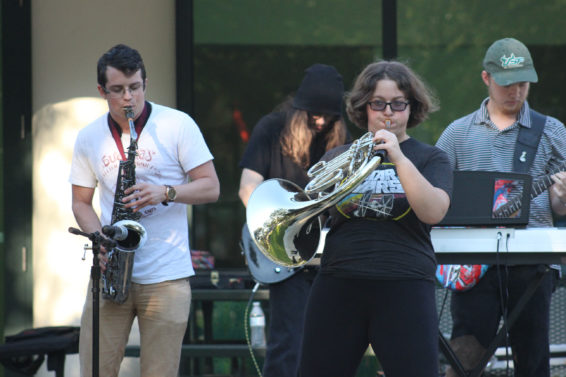For two years, the music from downtown echoed its way into my dormitory.
The mashup of instruments, singers and shouts became the ever-present background to my weekend nights. Filing through homework, I’d look out at the city lights from the window above my desk and wish for my own space to practice cello.
Four years as a music major at a fine arts high school had certainly spoiled me and I was used to the commodity of practice rooms.
To this day I still credit my high school success at Tampa’s Howard W. Blake School of the Arts to the fact that I could spend half of my day studying music. I often stayed after school to get extra time in the music building’s soundproof rooms. By the time I became a senior, the only thing that motivated me to get to school was my morning orchestra class and my final period AP Music Theory class.

In 2013, I finally graduated and arrived in St. Petersburg. I’d chosen the USF St. Petersburg campus because it seemed like the mecca for music and arts. The school itself was small, which pleased me, and I felt sure I’d find a quiet corner to play.
Shortly after settling into my private dorm room, I started to realize that practicing was not going to be as easy as it was in high school. My roommates expected silence, or at least nothing unrelated to ping-pong balls and trap music.
Playing Bach on my cello immediately made me the odd one out. After several attempts to string out some more tunes, I was shut down due to my instrument’s “obnoxiously loud” sounds.
I gave into my roommates’ complaints and started searching for other spots: the common rooms, the staircases and even outside; everywhere was always either in the way or in use. After several semesters of tense interactions with roommates, I finally managed to move off campus in Spring 2015. Once again, I felt at liberty to practice.
Now a senior, I am more familiar with the campus and have I come to realize that promising areas do exist here that could be designated and tailored to function as practice rooms. Harbor Hall, the USC and the Poynter Library already have existing spaces that could be remodeled or reserved for our student musicians.
Members of the Musician’s Club gather in Harbor Hall’s Palm Room and have performed at The Tavern. Their attempts to coordinate efforts in order to nourish a safe and musical campus environment proves the existing need on campus for practice areas.
Such a project also provides a solution to administration’s current efforts to encourage commuters to participate more on campus after their classes.
Students who are going home to practice or have moved away from campus because of a lack of accessible practice spaces would feel encouraged to stay on campus.
Our Student Government needs to dedicate a space for musicians. It would have little to no cost to the university, provided the designated spaces were empty classrooms or conference rooms. If the space proved useful enough, the school could move towards remodeling a space to be soundproofed.
Until then, any simple and easily accessible space would be sufficient to benefit an artform that could grow into something beautiful.




The St. Petersburg Public Piano Project will donate a piano.